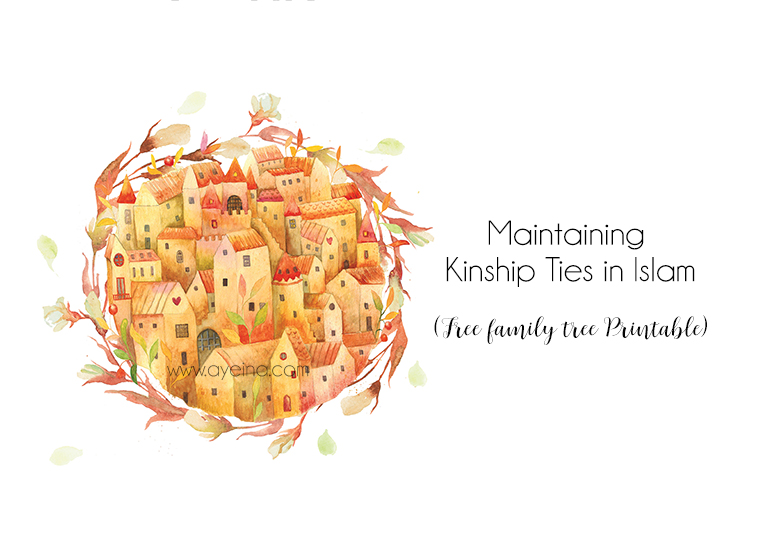by Saima Asghar (in collaboration with Team AYEINA)
Narrated Abu Huraira: I heard Allah’s Messenger (ﷺ) saying, “Who ever is pleased that he be granted more wealth and that his lease of life be pro longed, then he should keep good relations with his Kith and kin.” [Bukhari]
With a lot of powerful verses revealed on the subject and so many Ahadith narrated about the value of maintaining ties with kinship, we can say that maintaining good terms with our family members/relatives is one of the main responsibilities of a Muslim. Family in Islam has the high privilege second to none other than the rights of Allah.
The word ‘sila’ or ‘wasala’ in ‘Sila-tur-Rahim’ is derived from the triliteral root wāw sīn lām (و س ل) – which occurs twice in the Qur’an as the noun wasīlat (وَسِيلَة). It has different meanings like: to seek the favor, seek the means of nearness/approach/access, honorable, rank, degree, affinity, tie, nearness, come closer. The concept of ‘Rahima’, mercy, also comes from the sameroot i.e. Rahim (womb of the mother). This is not a coincidence that the beautiful name of Allah, ‘Ar-Rahman’ is connected with the word ‘Rahim’.
‘Abdur-Rahman bin ‘Awf’ said: ‘I heard the Messenger of Allah saying :”Allah, Most Blessed and Most High, said: ‘I am Allah, and I am Ar-Rahman. I created the Rahim (womb), and named it after My Name. So whoever keeps good relations with it, I keep good relation with him, and whoever severs it, I am finished with him.'” [Tirmidhi]
In this manner, it means to remain connected to our relatives in the manner that is acceptable and rewarding in the eyes of Allah. It means that we show them kindness, compassion and love, to help them both morally and financially – the much we are able to, or being connected in general.
Importance of Upholding Kinship Ties
The in-depth study of the Seerah of Rasulullah ﷺ reveals that one of the earliest commandments of Islam was to take care of the ties of kinship. Three most important incidents in the Seerah mentioned on the authority of Ibn Ishaaqthat shows the importance of the rights of the relatives (taken from seera tun nabi of allama shibli noumani):
1. When Amr ibn-e-Abas came from Yemen to Makkah in the earlier days of Nabuwa and heard that someone in Makkah is preaching a different message so he went to search Rasulullah ﷺ and asked ‘What are you? Rasulullah ﷺ replied,’ I am the Nabi. And he asked,‘What is a Nabi? Rasulullah ﷺ replied, ‘Allah sent me’. He asked again, ‘What does He sent you with? And Rasulullah ﷺ replied, ‘Allah has sent me with the message that we worship Allah alone and don’t worship these idols and we fulfill the rights of kinship in the best way.’
2. When Muslims migrated to Abysinia and The Negus called Jafer ibn-e-Abi talib to ask what has your Prophet ﷺ told you? Jafer bin Abi talib also replied that, ‘He has told us to worship one Allah and to avoid false gods, to speak truth and to take care of our family members.
3. Third incident happened when the message of Islam was sent to the emperor of Rome and by coincidence Abu Sufian, who was not a Muslim yet, was visiting the Rome. The emperor called him and asked him about this new religion. Even he knew clearly at that time what the message of Islam was i.e. to worship one Allah and to be good to your relatives.
Messenger of Allah, may Allah bless him and grant him peace, said, “There is no wrong action which Allah is swifter to punish in this world – in addition to the punishment which He has stored up for the wrongdoer in the Next World – than cutting off ties of kinship and injustice.” [Al-Adab Al-Mufrad 67]
Which relatives to maintain ties with?
Now the question arises – how far should we go in this ranking system? Generally speaking, our connection with our closest family members is always the strongest one in terms of maintaining the contact, then comes the branches that are further spread out of that tree. The closer the relationship, the more emphasis is upon us to connect with them…e.g. Parents, spouse/children, followed by siblings, followed by paternal/maternal uncles/aunts, followed by their children etc.
Please note that your duty of maintaining ties is with the mahrum relations basically – all relatives whom one (a male or a female) is permanently not permitted to marry. Some fuqaha’ are of the view that the relatives with whom ties of kinship must be upheld are the mahram relatives only. As for non-mehrum relatives, it is mustahabb (recommended) to uphold ties with them but it is not obligatory. But in short, there is no technical definition of how far we can go with our extended relations. We should go as far as possible for us for the sake of Allah. This is supported by a very powerful hadith:
Messenger of Allah (ﷺ) said, “You will soon conquer Egypt where Al-Qirat is frequently mentioned. So when you conquer it, treat its inhabitants well. For there lies upon you the responsibility because of blood ties or relationship (with them)”. [Muslim]
The Egyptians didn’t even look like the Qureshis, nor they acted, behaved or spoke like them but our Prophet ﷺ told them that you are connected to them and that too thousands of years ago through the mother of Prophet Ismail (A.S.), Hajar, who was an Egyptian.
How to Maintain or Rebuild the Ties of Kinship as a Muslim
You may ask – How often should I contact my relatives to uphold ties with them? When it comes to the frequency of calling or visiting relatives in order to maintain ties with them, this depends on the level of kinship and the customs and traditions of the society you live in. In the time of globalization when families have moved into different cities or countries, it has become difficult to constantly stay in touch with everybody keeping in mind the difference in time, life styles and places so in order to strengthen the bonds of kinship with distant relatives, following points shall be of great help in shaa Allah:
A man said to the Prophet (ﷺ): “Direct me to a deed which may admit me to Jannah.” Upon this he (the Messenger of Allah (ﷺ)) said, “Worship Allah and never associate anything with Him in worship, establish Salat, pay Zakat, and strengthen the ties of kinship.” [Riyad as-Salihin 1211]
1) Make a pedigree chart:
Pedigree Chart – also known as a family tree, lineage, or ancestry chart – shows family relationships in the form of a tree structure. Discuss and update it with the elders in the family. Have respect for all elderly people in your family, be all ears when they are telling their stories and try to learn from their past experiences. Once you’re done with your family tree, you can see from where you can start in terms of upholding ties. Keeping track of genealogy is encouraged in Islam. Abu Bakr Siddiq (R.A.) was respected in the days of ignorance because of his knowledge of genealogy of Arabs and it was considered a noble science back then.
Jubayr ibn Mut’im said that he heard ‘Umar ibn al-Khattab say on the minbar, “Learn your lineages so that you can maintain ties of kinship. By Allah, if there are some bad feelings between a man and his brother and he knows that there is kinship between him and that man, that will prevent him from breaking with him.” [Al-Adab Al-Mufrad 72]
You can write names of your paternal relatives on left side while writing maternal relatives’ names on the right side (the free printable of this color-in family tree is black and white so you can color code the generation stages on your own for personal clarity in shaa Allah).

2) Give gifts with love:
Some people only visit in return of the visit or give gifts only in return of the gifts. Try to begin with the positive gestures when it is time to connect with our family members and be the better of them all by fulfilling the Sunnah of giving gifts first. Relationship with kinfolks should not be just returning favors. Islam urges us to reach the higher degree.
The Prophet (ﷺ) said, “Al-Wasil is not the one who recompenses the good done to him by his relatives, but Al-Wasil is the one who keeps good relations with those relatives who had severed the bond of kinship with him.” [Bukhari 5991]
P.S. Handmade gifts can be an amazing way to strengthen bonds if you are clueless on how and what to gift the relatives or family members.
3) Give moral and financial support:
Be there for them – especially in the time of need. If there is somebody who is deserving, help them financially as well.
Prophet (ﷺ) said: “Giving charity to a poor person is charity, and (giving) to a relative is two things, charity and upholding the ties of kinship.” [Nasa’i]
When Sayyidna Aisha (R.A.) was slandered in the worst way, Abu Bakr (R.A.) found out that the man who participated actively in spreading the rumor was Mistah. He was his cousin whom Abu Bakr (R.A.) had been supporting financially. Naturally Abu Bakr (R.A.) withheld the charity he had been giving to him, out of disappointment but resumed after Allah revealed the verse – (24:22):
“…(…`Aisha said), ”…Allah revealed the ten Verses starting with: –‘Verily! Those who spread the slander..’ (24.11-21) All these verses were in proof of my innocence. Abu Bakr As-Siddiq who used to provide for Mistah some financial aid because of his relation to him, said, “By Allah, I will never give anything (in charity) to Mistah, after what he has said about `Aisha” Then Allah revealed:– ‘And let not those among you who are good and are wealthy swear not to give (any sort of help) to their kins men….’ (24.22) On that, Abu Bakr said, “Yes, by Allah, I like that Allah should forgive me.” and then resumed giving Mistah the aid he used to give him and said, “By Allah! I will never withhold it from him.” [Bukhari]
4) Leave ego behind:
Every human being is put into trial with the family members who test our patience every now and then. The strength of our faith will be tested through our families. Our ego can make things hard for us. Remember that we are not allowed to boycott any Muslim brother/sister for more than three days.
Allah’s Messenger (ﷺ) said, “Do not hate one another, nor be jealous of one another; and do not desert one another, but O Allah’s worshipers! Be Brothers! And it is unlawful for a Muslim to desert his brother Muslim (and not to talk to him) for more than three nights.” [Bukhari]
Ask Allah by His name, ‘Ya Mua’llif-ul-Quloob’ (the One who brings the hearts together) – bring our hearts together in peace and harmony. In shaa Allah we will talk about forgiveness in Islam in detail next month – How to forgive even when you can’t forget – till then, read below:
How to deal with toxic relatives?
Generally speaking, no relationship is perfect. Having problems with family members does not necessarily mean they are toxic. Relationship problems are completely normal and can often be solved by cooperation and communication based around kindness and respect.
But you may have particular family members or close relatives who cause fights, arguments and trouble everywhere they go. They may insult or disrespect you and your loved ones at every opportunity they can get. Some may respect you but may constantly make negative remarks about Islam or keep undermining your beliefs. And you may run away from the thought of being around them because you can’t keep your cool either.
In that moment, it’s important to remember this hadith!
Abu Huraira reported that a person said: Allah’s Messenger, I have relatives with whom I try, to have close relationship, but they sever (this relation). I treat them well, but they treat me ill. I am sweet to them but they are harsh towards me. Upon this he (the Holy Prophet) said: If it is so as you say, then you in fact throw hot ashes (upon their faces) and there would always remain with you on behalf of Allah (an Angel to support you) who would keep you dominant over them so long as you adhere to this (path of righteousness). [Muslim]
So remember this whenever you are hurt by close members of the family or relatives. An angel is there to support you! Allah’s help is there! Your dominance is through your kindness – Not by winning them in arguments or insult! BUT if toxic family members are harming your mental, emotional and spiritual health constantly, you can maintain distance and limit contact. If you think that being constantly in touch with them is going to push both of you at the edge of cutting ties altogether, it’s best to visit/call once in a while only.Technically, you can go through the following cycle of setting boundaries with toxic relatives, but not severing ties (this may or may not work in your situation – so your intuition is your best judge – use your conscience, do istikhara):
1) visit/call often if it’s possible for you (especially if such hurtful relations are really close to you – parents, children, siblings etc.)
2) visit on special occasions with gifts if visiting/calling often isn’t a possibility.
3) call on special occasions and send gifts – if visiting each other ends up in toxic behavior.
4) send message and gifts on special occasions – if calls end up in toxic conversations as well.
The most important thing is to not sever ties with them completely! And gifts make the hearts grow closer hence it’s best to include them in every now and then! Hating family members for being toxic only brings more toxicity into your own life.
‘Indeed when the Muslim mixes with the people and he is patient with their harm, he is better than the Muslim who does not mix with the people and is not patient with their harm.'” [Tirmidhi]
Upholding of ties of kinship, as al-Qaadi ‘Iyaad said, is of varying degrees, some of which are higher than others. At the very least, it is not forsaking one another, and upholding ties by speaking, even if it only saying salaam. That varies according to possibility and need. It may be obligatory or mustahabb. If a person upholds ties to some extent, even if it is not to the fullest extent, he cannot be called a breaker of ties of kinship, and if he fails to do what he is able to do and should do, then he cannot be called an upholder of ties of kinship.
In conclusion, don’t lose hope! It can be downright hurtful! But guidance is only within Allah’s Power, not our own. Make sincere du’a for them, be good to them and keep trying. Perseverance is key. Love has a power to change hearts with the will of Allah! and as the hadith below strongly narrates, make up your mind on who YOU are! You don’t have to stoop to their level – there will remain no difference between who you are as a person and who they are! You both become a part of toxic personality otherwise!
Messenger of Allah said: “Do not let yourselves be ‘yes-men’, saying: ‘If the people are good then we will be good, and if they are wrong then we will be wrong.’Rather, make up your own minds, if the people are good then you are good, and if they are evil, then do not behave unjustly.” [Tirmidhi]
If you were ever faced with a toxic relative, how did you face the situation? What helped you get them or yourself out of the toxic environment – without becoming them!? Comment below and help anyone out there in such situation in shaa Allah!
——————————————————————————–
Co-author’s Bio: Saima Asghar is a proud SAHWM (Stay-at-home working mom), a Human Resource expert and a student of Al-Huda International. She is a writer at https://saimawrites.wordpress.com/ – Thoughtful parenting and homemaking are her passions while meaningful writing and reading are her food for soul. She believes that life affords no greater responsibility and no greater privilege than the raising of the next generation.








It was a pleasure reading through this articles that mentions so many aspects of maintaining ties of kinship, especially the last part. The possibility of near kin being toxic is somehow considered a taboo, but Subhan Allah an unfortunate reality. Jazak Allah khair sister for discussing this. I completely agree with the methods mentioned to deal with toxic relatives. I wish I had ideas to offer but I hope more people will comment because I don’t know how to maintain sanity while upholding these relations. Reading the Hadith of Abu Huraira brought so much relief. And I never thought I was entitled to reduce contact and set boundaries.
In very close blood relations (especially those living in one home), limiting contact may not be possible though so in shaa Allah kind and wise communication along with patience helps. And most of the times, silence helps not aggravate things further. But in bitter relationships that are farther, one may try to maintain a certain distance just to not push things over the edge and cut ties completely. May Allah help us build strong blood ties!
I think a lot of conflicts happen because people do not know boundaries, nor their rights and obligations. E.g. in-laws are the responsibility of the husband, not the wife. As long as a wife’s and kids’ needs are covered, a man has the right to spend on his parents as he likes, he does not need permission from the wife, neither can she make remarks. People should be proactive in solving problems <> instead of just putting up with it. Not having closure makes a situation ongoing for indefinite time, an honest conversation is way better even if it is so hard to do. Unfortunately there is a lot of ego around, everybody thinks they treat everyone else fantastically well and they themselves are the ones wronged by others; in reality it’s best to start off assuming the opposite: that you could be better in how you treat others and have fear in the possibility you have unbeknownly offended/hurt someone. Our life is so easy, generations who went through poverty and war had more humility than us and did not turn bitter over little things. Personally, I don’t think it’s possible to cope until there is an honest discussion with a neutral party present, ideally someone who knows the religion well
True that. Jazakillah khair for your input. The generations in the past not only grew up in difficulties, but were also focused on their ultimate goal. They were far sighted and cared for their aakhirah much more than their dunya. Which is why we find amazing examples like that of Yusuf (as), Ibrahim (as), Muhammad (saws) and Mus’ab bin Umair etc. (In later generations) who didn’t let toxic relationships with their blood affect their focus on Islam.